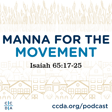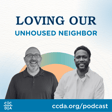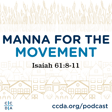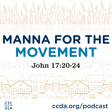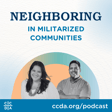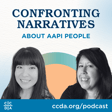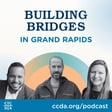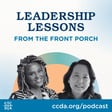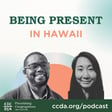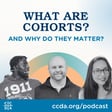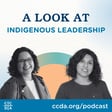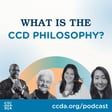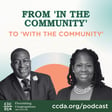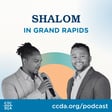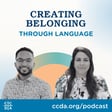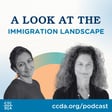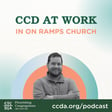Become a Creator today!Start creating today - Share your story with the world!
Start for free
00:00:00
00:00:01

The Minority Experience: Navigating Emotional & Organizational Realities
This week, Adrian Pay teaches us about the minority experience, navigating emotional and organizational realities. Today's session is taken from the 2018 CCDA National Conference in Chicago.
Recommended
Transcript
Athletes and Social Issues Controversy
00:00:02
Speaker
And there was a news anchor who will remain nameless for now, who basically said, you know, just shut up and dribble.
00:00:09
Speaker
OK.
00:00:09
Speaker
And so obviously that created an uproar, right, of people kind of going, you know, what are you talking about?
00:00:14
Speaker
You know, he's more than just an athlete.
00:00:15
Speaker
Right.
00:00:15
Speaker
He's a spokesperson.
Introduction to CCDA Podcast with Adrian Pay
00:00:17
Speaker
Welcome to the CCDA podcast.
00:00:19
Speaker
This week, Adrian Pay teaches us about the minority experience, navigating emotional and organizational realities.
00:00:26
Speaker
Today's session is taken from the 2018 CCDA National Conference in Chicago.
Adrian Pay's Background and Professional Roles
00:00:31
Speaker
We join Adrian with his session in progress.
00:00:35
Speaker
Can everybody hear me okay?
00:00:37
Speaker
All right.
00:00:39
Speaker
So my name is Adrian Pei, and this is the Minority Experience, Navigating Emotional and Organizational Realities that you came to.
00:00:48
Speaker
Wanted to tell you a little bit about myself before we get started.
00:00:51
Speaker
This is a picture of me and my wife, Jenny, and my two daughters there, who are on the left, bottom left, Juliet, and on the right, Amanda.
00:01:02
Speaker
And this is when we're at our best.
00:01:05
Speaker
And this is what we are like most of the time, my daughters, in real life.
00:01:09
Speaker
So welcome here.
00:01:11
Speaker
So thank you for making time to come out and be part of this.
00:01:16
Speaker
I wish that I could be, it feels like I'm a little bit far because of the podium here and everything.
00:01:22
Speaker
And also because I have to stay here because the recording so the mic needs to pick up my voice but I really want to hear and connect with you all throughout this time it'll be very interactive and you'll be have a chance to share with each other because I know there's a lot of wisdom in this room a lot of experiences and Part of this is you came here for a reason right you came here because you you have your own minority experience you have your own
00:01:45
Speaker
challenges in whatever space you're in, whether it's in this country or whether it's in the organization you're part of, the church you're part of.
00:01:50
Speaker
So want you to be able to share with each other as well and learn from each other in this time.
00:01:54
Speaker
So I wanted to actually give you a little bit of an idea of what we're gonna be covering in this workshop.
00:02:00
Speaker
So really the workshop objectives of what we're covering here is really the first and foremost thing is to understand how history impacts everything.
00:02:09
Speaker
And so this theme of rooted, the idea that there are roots to what happens.
00:02:15
Speaker
And the roots are very often in history.
00:02:17
Speaker
And so very often we're gonna talk about personal history, how that impacts us, as well as organizational history and how that impacts us.
00:02:23
Speaker
And then also talking about some practical tools for organizational change and team leadership.
Impact of History on Minority Experiences
00:02:29
Speaker
And one thing I want to say about that, so that's my line of work.
00:02:31
Speaker
So I actually work right now in, I work full time in organization development for Honda, the car company.
00:02:39
Speaker
So if any of you are, how many of you own Hondas?
00:02:41
Speaker
I'm curious.
00:02:42
Speaker
Okay, and if you don't like your Honda experience, don't worry, I don't take it personally, it's okay.
00:02:47
Speaker
But I work in really leadership development, organization development, helping the company in any way to improve, and that covers a lot of ground there.
00:02:58
Speaker
So my full-time job is in the corporate world.
00:03:00
Speaker
I don't know if the corporate sounds like a bad word, maybe, for some people.
00:03:05
Speaker
But there are good and bad people in the corporate world, and it's really just another culture.
00:03:08
Speaker
That's what I've learned.
00:03:10
Speaker
I work part-time in ministry.
00:03:12
Speaker
I work for an organization called Crew.
00:03:15
Speaker
Anyone with Crew or no Crew?
00:03:17
Speaker
Okay, so we have some Crew people.
00:03:18
Speaker
So that's my part-time world.
00:03:21
Speaker
So I kind of have a foot in the corporate and the ministry world.
00:03:24
Speaker
And part of that really was for me to help to understand, you know, okay, so I was in ministry for a long time, for 10 years.
00:03:30
Speaker
I helped to lead the leadership development of the Asian American ministry of CRU called Epic Movement.
00:03:36
Speaker
And I discovered a lot of challenges in leading there.
00:03:39
Speaker
And then part of me really wanted to kind of see what kind of challenges exist also in the corporate world.
00:03:45
Speaker
Are there similarities?
00:03:46
Speaker
Are there differences?
00:03:47
Speaker
What are things that, you know, sometimes it's so easy to kind of look at an organization and kind of blame that organization or a certain leader.
00:03:53
Speaker
And one thing I noticed, and why I wrote a book about this, but
00:03:57
Speaker
One reason why I wrote it was because I noticed that a lot of minorities, including myself, we'd have challenges, right, in a particular organization.
00:04:05
Speaker
And then what would happen is that we would, some would leave the organization or leave the place they're at.
00:04:09
Speaker
But then where they went to, they didn't necessarily have relief from that.
00:04:13
Speaker
They would have some of the same things would come up.
00:04:15
Speaker
So it wasn't so much about the organization or about a particular leader or a person all the time.
00:04:20
Speaker
Sometimes it was actually these internal emotional and organizational challenges.
00:04:24
Speaker
So one thing that I'm really gonna talk, we're gonna talk a lot about today is not necessarily the overt racism and discrimination, which does exist, we know, but it's about the other systemic forces that wear us down, that wear minorities down, and that also dehumanize both sides, including majority culture.
00:04:41
Speaker
And so that's really one motivation for this.
Complexities of Diversity and Justice Efforts
00:04:44
Speaker
One thing I wanted to say about this practical tools in terms of organizational change.
00:04:48
Speaker
Nothing I'm gonna talk about today is the answer, right?
00:04:51
Speaker
In terms of like, you know, we're all trying to figure out how to solve the issue of how to create more just structures in organizations and society, right?
00:04:58
Speaker
So there is, I don't know if any of us really has figured out the answer to that.
00:05:02
Speaker
And there's no quick fix.
00:05:03
Speaker
Sometimes people ask me in my work and they say, so just give me like the five minute, 10 minute version, right?
00:05:08
Speaker
And I say, it doesn't work that way, right?
00:05:10
Speaker
It's not supposed to be that easy.
00:05:12
Speaker
Diversity is not easy.
00:05:14
Speaker
And it's not even just about diversity.
00:05:15
Speaker
It's about justice, right?
00:05:17
Speaker
And all those things we talk about.
00:05:18
Speaker
So it's not easy.
00:05:20
Speaker
And I don't think that what I'm talking about today is going to be about that.
00:05:22
Speaker
It's really more about how do we diagnose diversity?
00:05:25
Speaker
the situation we're in, right, and the organization we're in.
00:05:27
Speaker
How do we know where we're at?
00:05:29
Speaker
And then how can we take the next appropriate step for where we're at?
00:05:32
Speaker
So some organizations are far along and they need to take the next step.
00:05:37
Speaker
Some are still just learning and they need to take the next step.
00:05:39
Speaker
So what is that next step?
00:05:40
Speaker
All right.
00:05:42
Speaker
This will be interactive.
00:05:42
Speaker
You get a chance to share with each other and ask me questions as well.
00:05:46
Speaker
Alright, so I want to start by kind of sharing a little bit about my personal history and my journey because it doesn't start with just me, right?
00:05:52
Speaker
It starts with my family.
00:05:54
Speaker
So if you look in the top left there, you'll see it's a picture of my grandmother.
00:05:58
Speaker
She's the third from the right and she grew up in Hong Kong and when she was in Hong Kong, the Japanese invaded.
00:06:09
Speaker
And so soldiers would come in and she actually dressed up even as a boy to kind of protect herself because she, as a woman, she felt like she might be victimized.
00:06:17
Speaker
So she decided to, you know, dress up as a boy to escape that.
00:06:21
Speaker
Then she fled to Vietnam.
00:06:23
Speaker
And then there's a lot of instability, political instability in Vietnam.
00:06:27
Speaker
And so at one point she had to actually move from, well, you'll see the top of the screen from Hanoi
00:06:32
Speaker
down to Saigon, which is now known as Ho Chi Minh City.
00:06:36
Speaker
And I don't know how many of you know the Vietnam War well, but what happened was that there was the Cold War, right?
00:06:42
Speaker
So there was the US and then there was the Soviet Union and China, and the US kind of backed the governments of the south part of Vietnam.
00:06:50
Speaker
And the China and Soviet Union back the north side of it.
00:06:53
Speaker
And so what happened was that when there was that conflict and eventually the north kind of drove the south out, a lot of Vietnamese were kind of forced to flee from Vietnam to the United States, right?
00:07:05
Speaker
So there's, you know, 100,000 practically Vietnamese came to the United States.
00:07:10
Speaker
And some of my grandmother's children were those people.
00:07:15
Speaker
And so they didn't really come of their own accord, right?
00:07:17
Speaker
They were like, they were kind of in a situation where they were driven from there because of the involvement of the United States, of the Soviet Union, et cetera.
00:07:26
Speaker
And so it wasn't like they were voluntarily come for more opportunity.
00:07:29
Speaker
And that was part of their story.
00:07:30
Speaker
And then of course a lot of them when they came, they weren't necessarily welcomed in the United States.
00:07:35
Speaker
And they were told, go back to your country.
00:07:37
Speaker
And then you can see the pressures on both sides.
00:07:40
Speaker
They're not at home in Vietnam and they're not home in their country.
00:07:43
Speaker
And so that's part of what drove my mother to come to the United States was that context there.
00:07:50
Speaker
My actually my grandmother when she was my mom came over but there was still a couple of kids that she had in the Vietnam when the war was happening and actually a bomb even fell in my grandmother's backyard Fortunately, it didn't detonate but it was that's how close it was for them
00:08:08
Speaker
So when I think back on my story, you know, really there was so much of these forces historically and different nations who were involved in things that drove my mom to come to the United States and to learn, you know, the English language and whatnot.
00:08:21
Speaker
And then eventually for me to be born in the United States
Adrian's Book 'The Minority Experience'
00:08:23
Speaker
and to learn English.
00:08:25
Speaker
So a lot of these forces came from way before me.
00:08:27
Speaker
For my dad,
00:08:31
Speaker
He came over to the United States and he was one of a handful of Asian, Asians really in his school.
00:08:38
Speaker
You can see that little arrow pointing to him.
00:08:40
Speaker
And when he came over to the States, he was, it wasn't just about language.
00:08:44
Speaker
He was bullied for not knowing American sports.
00:08:48
Speaker
So like he didn't know who Babe Ruth was.
00:08:49
Speaker
And so he experienced a lot of discrimination in that area.
00:08:53
Speaker
And so when he had me,
00:08:56
Speaker
He said, I'm gonna make sure that doesn't happen to my son.
00:08:59
Speaker
So I learned soccer, baseball, tennis, basketball.
00:09:04
Speaker
He really wanted to make sure that I could fit in, right?
00:09:08
Speaker
So you can kind of see there, that's me right there on the right.
00:09:11
Speaker
I was the only non-white person on my baseball team, and I'm just trying to fit in, right?
00:09:15
Speaker
And so the whole context of that was shape of my dad.
00:09:19
Speaker
You look at he worked for a company called Xerox.
00:09:22
Speaker
They used to call it Xerox, you know before printing when when it actually used to be bigger and He worked as kind of a cross-cultural guide between Japan and the US and then For me right now I work for Honda which is actually a company that's based in Japan But it's in the United States as well and I actually you know work with both Japanese and Americans so you can kind of see how that influenced me and some of the work that I do and
00:09:45
Speaker
And finally, with Epic and Crew.
00:09:49
Speaker
That's a very, the Asian kind of context as well as the white context of Crew, which is majority white.
00:09:55
Speaker
So a lot of the history has shaped me from my past backstory.
00:10:00
Speaker
But I wanted to kind of give you a chance for you to think about it for yourself.
00:10:03
Speaker
So wanted you to actually, oh, one more thing, sorry, before I get to that.
00:10:06
Speaker
Okay, one more kind of fun fact here, right?
00:10:08
Speaker
Sometimes it carries forward too.
00:10:09
Speaker
So I had a chance to write a couple months ago a book called The Minority Experience.
00:10:13
Speaker
That's the title of the seminar, talking about the forces that wear down minorities.
Personal Histories Influencing Work
00:10:17
Speaker
And that's a picture of my daughters there, and they actually are writing their own books.
00:10:23
Speaker
So you can kind of see that.
00:10:24
Speaker
They both have their own books, and they're like so excited.
00:10:26
Speaker
When they first got the book, they opened it and said, oh, daddy's face is on the back.
00:10:29
Speaker
And they said, no, I'm going to write my own book.
00:10:32
Speaker
And I said, yes, go for it, you know?
00:10:35
Speaker
And to me that gave so much meaning to my efforts.
00:10:38
Speaker
I was like, this is why I want to write because I want people of color, I want women, I want my daughters to know that they can make a difference, that they can have a voice in this country and to know that they're actually already thinking about it.
00:10:50
Speaker
And the things they talk about, they're actually asking questions about, so who are Native Americans and what happened in the past and what is justice?
00:10:58
Speaker
And so these are the things that can carry forward in history as well.
00:11:02
Speaker
Alright, so I want you to add this whole idea of the past isn't over and done with, it lives in the present, is throughout everything that we're talking about.
00:11:08
Speaker
Alright, so I want you to actually turn to the person next to you and actually ask them this question, how does your personal and family history impact the work you're doing now?
00:11:17
Speaker
So think about it, think about your personal and family history and how does that impact the work that you're doing right now?
Navigating Personal and Organizational Histories
00:11:23
Speaker
So go ahead and share, take turns.
00:11:26
Speaker
Okay, so I'm curious,
00:11:32
Speaker
Raise your hand if you are in the same line of work as your parents or grandparents.
00:11:39
Speaker
Raise your hand.
00:11:41
Speaker
Okay.
00:11:42
Speaker
How about if who is in the same line, the same organization as your parents or grandparents?
00:11:47
Speaker
Raise your hand.
00:11:48
Speaker
Okay.
00:11:49
Speaker
What were some interesting insights that you had?
00:11:51
Speaker
I'm curious.
00:11:52
Speaker
Anyone want to share?
00:11:54
Speaker
Oh, yeah.
00:11:54
Speaker
What were some insights you gained about kind of how your past impacted your current work?
00:11:59
Speaker
So I think that we all have a lot of things to share and stories, but clearly, you know, our past has impacted
Psychological Challenges for Minorities
00:12:05
Speaker
us, right?
00:12:05
Speaker
And what we're doing and the strengths and the gifts we have to bring in here and some of the challenges as well.
00:12:09
Speaker
So I wanted to share with you a little bit about my own experiences in terms of the challenges that I faced organizationally, because it's one thing to talk about our personal history.
00:12:17
Speaker
It's another thing to talk about organizational history.
00:12:19
Speaker
It's interesting, we were hearing earlier from, I think it was Myra and Coach, and interesting how they came up and talked about how
00:12:26
Speaker
It's one thing to minister to the people we're serving.
00:12:29
Speaker
It's another thing to look at our own organization and say, hey, it's not so easy when we're working with our own people, right?
00:12:34
Speaker
You know, in our own organization.
00:12:36
Speaker
And so my journey was that I started working for Crew, which is over 88% white.
00:12:44
Speaker
And I came in as a person who, you know, is an ethnic minority and feeling like I'm gonna come in, I'm very confident, and I have all this stuff I can educate people with, you know, about my culture and, you know, all the background that I have with my parents.
00:12:57
Speaker
But what I found was that my first month, I was slowly broken down.
00:13:01
Speaker
And it wasn't, again, necessarily because of overt racism and discrimination, which does exist, but it was about other things.
00:13:07
Speaker
So I went to this new employee training, and when I was there, you know,
00:13:14
Speaker
My wife and I were the only ethnic minorities in our class.
00:13:18
Speaker
And so sometimes they would be sharing about different certain theologies and viewpoints.
00:13:25
Speaker
And some of those, very often when you look at some of the quote unquote divergent theologies, they often are very tied in with certain cultures.
00:13:35
Speaker
So like for example Asian American culture or the Muslim religion or whatever it may be.
00:13:41
Speaker
And so you have this time where at some point we would raise our hand and say, well as Christians we don't agree with all the theology here that we're talking about here, but this is part of our family history and our traditions.
00:13:58
Speaker
the justices and injustices that we've experienced.
00:14:01
Speaker
And so we ought to be respectful of those things, shouldn't we?
00:14:04
Speaker
But we felt like the experiences we had were kind of silencing of that and kind of coming back and saying, no, you know, it's just like, this is just the way it is.
00:14:11
Speaker
And they would use theology, right?
00:14:13
Speaker
But in reality, it was a group of all white staff, you know, and who were teaching and instructing.
00:14:19
Speaker
And so they couldn't see beyond that level, right, of what was going on.
00:14:22
Speaker
And what I discovered was that, you know, whether it was in the classroom, in the theological level, or if it was socially just trying to fit in with people, I found myself starting to have this really difficult psychological experience.
00:14:35
Speaker
I started to ask myself questions in my head about, like,
00:14:39
Speaker
Okay, so we have a different viewpoint.
00:14:42
Speaker
So if nobody else feels the same way as we do and nobody's saying anything, it's just silence or passivity, then am I wrong about that?
00:14:51
Speaker
And maybe am I the problem here?
00:14:55
Speaker
And why are people looking at us a certain way?
00:14:59
Speaker
Why are they staring at me that way?
00:15:02
Speaker
I started to have these thoughts that I never had before.
00:15:04
Speaker
And it was kind of really, it made me doubt myself.
00:15:06
Speaker
I had this experience of self-doubt
00:15:08
Speaker
I had this experience of feeling like, do I have to be someone different than who I am, you know, as an ethnic minority in order to fit in here, into this system, right?
00:15:17
Speaker
I started to feel a sense of weariness, of kind of like, wow, I already feel tired.
00:15:20
Speaker
I've only been here three weeks and I'm already tired.
00:15:23
Speaker
And I was wondering, what is going on here?
00:15:24
Speaker
Because I came in so confident in what is happening.
00:15:27
Speaker
So some of the questions I asked myself were, yeah, this idea, am I the problem?
00:15:31
Speaker
Would it make a difference if I went away?
00:15:33
Speaker
And I was thinking, wow, I came in here trying to think about educating people about being Asian American or whatever it is.
00:15:40
Speaker
In reality, what I was discovering was something that was more about the minority experience, meaning the pressures that minorities feel in a majority context, about the power gap.
00:15:50
Speaker
So really, what I was discovering was that whatever category you want to talk about, you want to talk about race, you want to talk about gender, any area where there's a gap of power between the majority and the minority, there's these pressures that minorities experience.
00:16:03
Speaker
And that's what I was experiencing.
00:16:05
Speaker
So what I decided to do was I decided to, well eventually I wrote a book about it called The Minority Experience, which is right here if it's helpful for you.
00:16:14
Speaker
And really what I did was I tried to kind of write down my own story about my experiences in a majority white organization and in this country.
00:16:22
Speaker
But then as I did that, you know, I talked to friends about it.
00:16:24
Speaker
A lot of my friends, you know, who are African American, who are Native American, who were, you know, Latina friends, they would share similar feelings and thoughts and experiences they had.
00:16:35
Speaker
And then I studied the history books and discovered that a lot of history had similar experiences.
00:16:41
Speaker
And so I thought, well, I wonder if there's some common pattern.
Systemic Forces Beyond Cultural Intelligence
00:16:44
Speaker
So I kind of grouped into three categories.
00:16:47
Speaker
And they were called pain, power, and the past.
00:16:50
Speaker
And that's how I define the minority experiences, pain, power, and the past.
00:16:52
Speaker
So the first category, pain, you know, you look at,
00:16:55
Speaker
anything from shootings that happened, right?
00:16:57
Speaker
There was a recent, you know, Kroger shootings, right?
00:17:00
Speaker
Which would have happened in a black church, potentially, right?
00:17:03
Speaker
Or you look at the Dakota Access Pipeline, right?
00:17:05
Speaker
And you realize that these things that happen are not just about cultural intelligence or, you know, like sometimes I'm in environments where people talk about, we just need to understand that everybody has a culture, you know, and that there are like differences in the way we communicate.
00:17:20
Speaker
But these things went deeper than that.
00:17:22
Speaker
It went to injustice, it went to power gaps and differentials, and there was pain in the stories of people.
00:17:28
Speaker
So really, there was a whole layer of pain that was deeper in terms of the emotional experiences I was feeling about feeling broken down, weary, self-doubt, and kind of feeling I need to change who I was, that the culture and intelligence stuff didn't speak to as much.
Unequal Opportunities Across Fields
00:17:42
Speaker
Then there was power.
00:17:43
Speaker
So you look at, anyone see Crazy Rich Asians, that movie?
00:17:46
Speaker
Okay, right, so you hear about this idea of the American dream, right, the idea that, hey, if I just work hard enough, I can get it.
00:17:54
Speaker
But you look at Constance Wu, she had a quote in the New York Times where she talked about kind of the challenges that Asian American actors face.
00:18:01
Speaker
And she said, an incredibly talented Asian actor might be considered for a leading role maybe once or twice in a lifetime.
00:18:07
Speaker
That's a highly pressurized situation.
00:18:08
Speaker
She says they have to, they almost have to work out for the, try out for the opportunity like, let's say, the Olympics, if they're competing against other white people, right?
00:18:16
Speaker
So you have this issue where there's not, we're not all on equal ground, right, in whatever we're doing.
00:18:20
Speaker
And so you look at gender, obviously, right?
00:18:22
Speaker
You know, 50%, sometimes people go to numbers, they think when they think of minorities, they think it's like the only person of that
00:18:29
Speaker
category in the room.
00:18:30
Speaker
But you look at women, 50% of the population, how long did it take for them to get the right to vote, right?
00:18:35
Speaker
And you look at the leadership, right?
00:18:37
Speaker
100% male presidents, 0% female presidents, no matter what party, right?
Historical Power Dynamics and Racial Issues
00:18:41
Speaker
So you have those realities which are huge imbalances and it's not just about numbers.
00:18:46
Speaker
Then you deal with the past and how the past impacts everything that we have.
00:18:51
Speaker
I don't know how many of you heard about this, this whole, anyone you heard about the whole shut up and dribble?
00:18:55
Speaker
Okay, so those of you who have not heard about it, there was basically a time where LeBron James, who's now a Laker actually, very bizarre to see him in Los Angeles, but he was speaking up about justice issues, race issues, and there was a news anchor who will remain nameless for now,
00:19:13
Speaker
who basically said, you know, just shut up and dribble, okay?
00:19:17
Speaker
And so obviously that created an uproar, right, of people kind of going, you know, what are you talking about?
00:19:21
Speaker
You know, he's more than just an athlete, right?
00:19:23
Speaker
He's a spokesperson.
00:19:24
Speaker
And so this news anchor actually responded by saying, defended themselves.
00:19:28
Speaker
And let me just read to you some of what this person wrote.
00:19:31
Speaker
She said, a number of years ago, I wrote a bestseller called Shut Up and Sing, in which I criticized celebrities like the Dixie Chicks and Barbra Streisand, who were thrashing the president at that time.
00:19:43
Speaker
I've used a variation of that title for more than 15 years to respond to performers who sound off on issues like this.
00:19:48
Speaker
I've told Robert De Niro to shut up and act, Jimmy Kimmel to shut up and make us laugh, and just this week told the San Antonio Spurs coach Greg Popovich to shut up and coach.
00:19:59
Speaker
And basically she said that, you know, hey, this is not the first time I've done it.
00:20:02
Speaker
There was no racial intent in my remarks, right?
00:20:05
Speaker
Now, I'm going to toss you a softball here, right?
00:20:09
Speaker
What's in common between Barlow Streisand, Robert De Niro, Jimmy Kimmel, Greg Popovich that is not true about LeBron James?
00:20:16
Speaker
What's that?
00:20:18
Speaker
They're white, right?
00:20:20
Speaker
And I think that that's where there's a certain missing lens here of seeing that everybody's on equal ground and not understanding how it impacts things.
00:20:28
Speaker
So why would it be different with LeBron James, who's a black athlete and she's white, given history?
00:20:34
Speaker
Anyone have any thoughts on that?
00:20:37
Speaker
What's that?
00:20:38
Speaker
Or what do you think that phrase would mean given history and power dynamics for him to hear shut up and dribble?
00:20:48
Speaker
You're powerless.
00:20:49
Speaker
You have no voice, right?
00:20:51
Speaker
You, yeah, go ahead.
00:20:55
Speaker
Yeah, or even like I make the rules, right?
00:20:57
Speaker
Yeah, you go ahead, sir.
00:20:58
Speaker
Yeah.
00:21:00
Speaker
Yeah, go ahead, yeah.
00:21:02
Speaker
Thank you, that's exactly what I was gonna say.
00:21:04
Speaker
I'm glad you said it.
00:21:05
Speaker
But really, yeah, like, hey look, I make the rules, she's saying, right?
00:21:08
Speaker
You know, like you can do what I pay you to do or what you, to entertain, like that, right?
00:21:12
Speaker
But don't step into the area where we can speak out about things that really affect society, right?
00:21:18
Speaker
So that is why those kind of statements are so inflamed, right?
00:21:21
Speaker
When you look at history, you see everything that comes into play.
00:21:24
Speaker
Or we all know this, a lot of us have seen this picture, right?
00:21:28
Speaker
We look at the migrant caravan and we say, why are all these debates about immigration, right?
00:21:33
Speaker
And you look back and you just realize, going back, you know, hey, you know, there's actually this, in my book I talk about Juan Gonzalez who did some study on showing how a lot of the reason why people have been immigrating is because of North American, United States involvement in the politics and economies of Central American countries.
00:21:52
Speaker
So very often it would create these poverty conditions and political instability that would drive people north.
00:21:59
Speaker
Or you would have even white employers who would actually be recruiting people from Central America for cheap labor.
00:22:05
Speaker
So they get recruited there and then all of a sudden when they're done, they say, okay, you're not welcome anymore.
00:22:10
Speaker
Leave right so imagine what that would feel and you go back even further and you realize that you know the original southern states of the United States many of them were occupied by with by Latino cultures let's Central American basically what is now Central America and you had you know like white settlers who came in and through political force as well as political manipulation kind of had
00:22:35
Speaker
this is where the boundary is, right?
00:22:36
Speaker
And they basically annex those territories.
00:22:38
Speaker
And now you have a situation where like that's their home, but literally they're saying, now you're a foreigner in your own home, and say you have to leave.
00:22:46
Speaker
So you imagine people kind of saying like you have to leave, and then now they're coming back and saying you're foreigners,
Understanding History to Address Racial Issues
00:22:51
Speaker
right?
00:22:51
Speaker
So that's why there's so much emotionally charged when you look at the past.
00:22:54
Speaker
It informs almost everything that we have, any debate we see about race today, whether national anthem protests, whatever you want to look at.
00:23:00
Speaker
The past means everything.
00:23:03
Speaker
So what does this all have to do, you know, this is the framework that I write about and that I think impacts us all.
00:23:09
Speaker
So what do we do with this in terms of organizations?
00:23:12
Speaker
Well, I mean, we look at, you know, here's another group of people here, right?
00:23:17
Speaker
We know about Deuteronomy.
00:23:18
Speaker
So I write about this, about how, you know, a people who basically were once foreigners and to remember that we are to love those who are foreigners, right?
00:23:27
Speaker
Who are not part of our group, right?
00:23:33
Speaker
Hi, I'm Lorenzo.
00:23:34
Speaker
What I love about CCDA is being connected to so many amazing leaders across the country.
00:23:40
Speaker
Welcome to the CCDA podcast.
00:23:51
Speaker
When we look at pain power in the past, how do we bring it back to the organization in the situation we're at?
00:23:55
Speaker
So I asked a couple questions here, right?
00:23:57
Speaker
For pain, what are the biggest pain points of minorities in our team, church, or organization, right?
00:24:01
Speaker
How do we diagnose pain?
00:24:03
Speaker
Power, who has the power in the structure of our leadership and decision making?
00:24:06
Speaker
Who's calling the shots, so to speak,
Strategies for Organizational Change
00:24:09
Speaker
right?
00:24:09
Speaker
and the past, what and who influenced our group to be what it is today, when you look at the founders.
00:24:15
Speaker
And when often we look at that, we discover quite a bit.
00:24:18
Speaker
So just take a minute to turn to the person, maybe the other person on the other side of you, and discuss one of those questions with them.
00:24:24
Speaker
And maybe choose the one that's the most challenging for you and your group right now.
00:24:27
Speaker
All right?
00:24:28
Speaker
Take a minute to do it.
00:24:30
Speaker
All right, sorry to interrupt you.
00:24:31
Speaker
I know you're having good conversations.
00:24:33
Speaker
We'll continue forward.
00:24:35
Speaker
Feel free to continue those conversations after the time and again I'll be doing question and answers at the end as well, okay?
00:24:42
Speaker
Thanks, so hopefully this provides a little bit of a framework to identify the things that are going on in your organization or in your context, and then to kind of take the conversation to a deeper level.
00:24:51
Speaker
So I wanna talk along those lines, kind of in my work in organization development, is really how do we have certain things that we can do if we want to make a difference, right?
00:24:58
Speaker
Because no matter what context you're in, what you're serving in, I'm sure you all want to make a difference where you are, right?
00:25:04
Speaker
To change, involve the team you're leading, the organization you're leading, whatever it may be.
00:25:08
Speaker
So I wanna kind of talk about some things that might be helpful.
00:25:11
Speaker
as you do that.
00:25:12
Speaker
So a couple questions I would say.
00:25:14
Speaker
Here are the questions for organizational change you can consider.
00:25:17
Speaker
Number one is why change?
00:25:19
Speaker
Who should lead?
00:25:21
Speaker
what is realistic, and what is the problem.
00:25:24
Speaker
And these are just four of the steps.
00:25:26
Speaker
There's actually seven that I outline in my book, but this is all questions we ask before we get to how.
00:25:34
Speaker
Because so often we wanna jump to how.
00:25:36
Speaker
How do I do this?
00:25:36
Speaker
How do I do that?
00:25:37
Speaker
The pragmatism, like what are the tools I can use?
00:25:39
Speaker
And one thing that, I saw this great quote in my work at Honda,
00:25:45
Speaker
and it was by Albert Einstein, okay?
00:25:47
Speaker
And he said, if I had an hour to solve a problem, I'd spend 55 minutes thinking about the problem and five minutes thinking about solutions.
00:25:55
Speaker
Because so often we have this anxiety that we wanna fix it, we wanna fix it, we wanna do it, we wanna start training, we wanna start diversity training, we wanna bring in a guest speaker, whatever it is, but we don't even know what we're doing it for.
00:26:05
Speaker
What is the problem where we're at?
00:26:07
Speaker
And so really, these questions that I'm gonna go into each one a little bit more detail to kind of diagnose this a little bit more carefully before we get into it.
00:26:15
Speaker
Because very often we need to know what we're
Motivations for Change: Justice and Innovation
00:26:17
Speaker
dealing with.
00:26:17
Speaker
Okay, so the first one is why change, all right?
00:26:20
Speaker
And so the most obvious one that probably comes to mind for a lot of people is it's the right thing to do, right?
00:26:25
Speaker
Okay, we know there's the issue of justice.
00:26:27
Speaker
There's the issue of the image of God, right?
00:26:29
Speaker
in a Christian context, right?
00:26:31
Speaker
Obviously that doesn't work for me in the corporate world to say it's the image of God.
00:26:33
Speaker
They'll be like looking at me like, what are you talking about, right?
00:26:35
Speaker
But there is a sense of like the dignity of people, right?
00:26:38
Speaker
But the reality is that sometimes we'll encounter situations where like no matter how much we hit that nail with our hammer, it just doesn't drive the conversation forward.
00:26:49
Speaker
So in the absence of being able to necessarily just rely on that one thing over and over again, what are some other things that we can consider?
Leveraging Diverse Teams for Innovation
00:26:56
Speaker
So another thing is innovation.
00:26:59
Speaker
All right, so the question is, when we think about the motivation to change, are we actually leveraging the diverse staff that we have for their new ideas, right?
00:27:07
Speaker
Or are we getting new ideas?
00:27:08
Speaker
Are we just kind of stagnating where we are as an organization, as a church, right?
00:27:12
Speaker
Are we letting our minorities transform processes, right?
00:27:18
Speaker
Whether it's like, you know, the way that meetings are run, the way that the marketing or the outreach is happening, the processes, right?
00:27:25
Speaker
Because they will bring new ideas to that.
00:27:28
Speaker
So are we letting them be innovative is a question that we can consider, right?
00:27:31
Speaker
Because by nature, if we only have a very, you know, kind of status quo, the way things have been done,
00:27:36
Speaker
or a mostly white team, or only a couple cultures represented, you're going to be missing out on innovation.
00:27:42
Speaker
Another area is customer insight, right?
00:27:44
Speaker
So whatever field you're in, right, how can you better connect with the diverse communities that you serve?
00:27:50
Speaker
So very often, minorities are more in touch with people, right?
00:27:53
Speaker
The people that we're trying to reach, the people we're trying to serve.
00:27:55
Speaker
So how do we actually leverage them being in touch with that to take advantage of, you know, all that they could do in terms of growing, you know, the organization we're part of and taking it to the next level?
00:28:07
Speaker
And then finally, dynamic leadership, right?
00:28:09
Speaker
Are we truly incorporating unique styles and traditions in our group, right?
00:28:13
Speaker
Or is it kind of just this idea of cosmetic diversity, the idea that it's just skin deep, right?
00:28:20
Speaker
So for example, you know, like in many times, like what I've noticed speaking as an Asian American is that there's a lot about our style that if I was in a group of white people, they move so quickly and they talk, you know, let's go to the next decision, let's move it on.
00:28:33
Speaker
Whereas when I'm in a group of Asian Americans, people take their time to really think and reflect and build a consensus.
00:28:39
Speaker
And sometimes that's really valuable.
00:28:41
Speaker
Are we using that equally to how much the white setting where it goes so quickly sometimes?
00:28:46
Speaker
Or what are we
Leading Diversity Initiatives
00:28:47
Speaker
missing?
00:28:47
Speaker
So can we employ other groups and other people, diversity, who can really take that leadership to the next level?
00:28:54
Speaker
All right, so that's why change.
00:28:56
Speaker
So figure out like what, you know, as you think through this motivation about that, how can we actually leverage not just the justice and image of God, but some other areas to kind of take us forward.
00:29:06
Speaker
Then the next question is really who should lead, okay?
00:29:08
Speaker
So, you know, I guess the most obvious question is should I be the one to lead, right?
00:29:13
Speaker
But assuming you are the right person to lead, you know, the
00:29:17
Speaker
I think there's a couple things that have to be in place.
00:29:20
Speaker
And I think that obviously it's ideal to have people of color leading any kind of justice initiatives, but we don't want it just to become, again, tokenism, right, or cosmetic diversity.
00:29:32
Speaker
We want it to really be something that truly embeds who they are.
00:29:36
Speaker
And so some of the things that we want to consider as we do this is if you're trying to lead any kind of effort where you are, you need allies.
00:29:45
Speaker
You can't go it alone.
00:29:46
Speaker
One thing that you learn in organization development is that it's not really, it's almost impossible for one person to change a whole culture, right?
00:29:53
Speaker
You need to have allies.
00:29:54
Speaker
So really look around and find
00:29:55
Speaker
who are some like-minded people, people who think similarly, right?
00:29:59
Speaker
Don't go it alone.
00:30:01
Speaker
Another one is alignment.
00:30:02
Speaker
Okay, so one thing that I've, as I worked with a couple churches about, you know, their efforts to move towards greater inclusion, I asked them and said, you know,
00:30:15
Speaker
you should really think about making a three to five year plan.
Integration of Diversity Efforts
00:30:18
Speaker
Don't just be reactive to what you think needs to happen now.
00:30:20
Speaker
But make a long term plan and then ask your leaders for their long term plan.
00:30:24
Speaker
And then see how it lines up.
00:30:25
Speaker
Because very often you'll discover in that process that where they're at is not where you're at.
00:30:30
Speaker
And then you can kind of have an honest conversation about that.
00:30:33
Speaker
So that's one thing that I highly recommend.
00:30:35
Speaker
And then finally, integration.
00:30:37
Speaker
You want to make sure that whatever the effort is in terms of diversity or whatever it may be is not just delegated to you.
00:30:44
Speaker
I see some people who have said, like, okay, they just said, hey, we want you to lead the effort.
00:30:48
Speaker
But you really got to hold them accountable and say, how is this going to impact everything that the church is doing, that the organization is doing in terms of the mission statement, the strategy, the tactics, every department?
00:30:58
Speaker
That's why I think there's an issue sometimes when you have a whole department for just that diversity or work or justice work, whatever it may be.
00:31:04
Speaker
So you want to integrate into everything that happens.
00:31:06
Speaker
So really hold your leaders accountable to that.
00:31:08
Speaker
And remember that even if you're not the, you have a team that is already quite diverse, but there's still some people who are not represented, even if you're not gonna change the nature of your team, you can still involve other communities in other ways.
00:31:22
Speaker
You can still interview them.
00:31:24
Speaker
You can still represent
Realistic Goals for Diversity Change
00:31:25
Speaker
them.
00:31:25
Speaker
In fact, it's more important that the people who are leading efforts of change are actually tapped into the communities, diverse communities, to asking them for their opinions, rather than have a group of diverse people who aren't actually representing anything.
00:31:38
Speaker
They're just kind of there because they want to be part of the effort.
00:31:42
Speaker
You want to make sure they're representing people.
00:31:43
Speaker
So make sure that you can interview people and you can partner with groups too, even if they're not directly involved in that.
00:31:47
Speaker
So partner with other groups and other communities to involve them.
00:31:51
Speaker
So that's the question of who should lead.
00:31:53
Speaker
So make sure that question is answered very well before you get to the work.
00:31:57
Speaker
And then finally, what is realistic?
00:31:59
Speaker
Okay, so this is one where I think that, again, very often it's easy to kind of be very idealistic about where we want
Stages of Organizational Diversity Maturity
00:32:05
Speaker
to get to.
00:32:05
Speaker
But the reality is that, I think this is a very no-brainer quote, but I like this quote, is that things are the way they are for a reason.
00:32:13
Speaker
Things have gotten to be the way they are for a reason.
00:32:16
Speaker
So one thing that I write about in the challenges of working with the crew environment was that you had this organization that really started off majority white and a lot of its success was built because of the white support base, financial support base, right?
00:32:30
Speaker
And all the structures and the power and the way things were done.
00:32:33
Speaker
And so basically that built it to be successful the way it is right now.
00:32:37
Speaker
And the reality is that very often people kind of, we kind of,
00:32:41
Speaker
We in the organization of Crew kind of look at that and kind of say, oh man, I wish it wasn't that way.
00:32:45
Speaker
It shouldn't be that way.
00:32:46
Speaker
But the reality is that you can't just change it by wishing it and saying, I wish it was different.
00:32:52
Speaker
The reality is you have to understand why it came to be the way it is right now.
00:32:55
Speaker
And that's some of the barriers to why it's hard to change.
00:32:58
Speaker
because it's been so successful the way it's been this far.
00:33:02
Speaker
So it's really tough, but you have to understand how it got to be the way it is to move on.
00:33:08
Speaker
So I think making an organizational assessment is really the next step.
00:33:11
Speaker
What is realistic?
00:33:12
Speaker
Then that way you'll understand like, okay, if it's really at this point right here as opposed to where I want it to be up here, I can kind of calibrate my expectations and say, okay, for stage one, for year one, we need to get to here, and then stage two, and then so on, right?
00:33:25
Speaker
So we look at Diversity Inc, they actually have a couple of measures for how you evaluate your own organization.
00:33:31
Speaker
And the first one they call is a stage called celebration focused.
00:33:36
Speaker
And what that means is that the company or the church or whatever it is, they've begun to recognize the value of diversity
00:33:41
Speaker
and they have kind of like, they bring in guest speakers,
Identifying Root Problems in Organizations
00:33:44
Speaker
they play videos of well-known people of color, they might have like a Black History Month, you know, that kind of thing, right, where it's all about celebration, right?
00:33:52
Speaker
But you think about it, it's still at a distance, right?
00:33:54
Speaker
It's not integrated with the actual workplace, right?
00:33:57
Speaker
It's just, you can keep it at a distance.
00:33:59
Speaker
Now you have workplace focused, which is kind of the next stage where maybe the church or the organization has created a diversity plan.
00:34:06
Speaker
So maybe there's actions, objectives, and milestones, and there's small groups, there's support groups, there's task forces, there might even be a structured mentoring program, which they have there.
00:34:18
Speaker
And so in some ways there's now kind of a competitive advantage that that group has, that other people don't have, right, in stage one.
00:34:25
Speaker
So most companies are in stage one and stage two.
00:34:28
Speaker
Stage three is marketplace focused.
00:34:30
Speaker
And this is where now there's actually, there's metrics driven accountability for the group that you're in, right?
00:34:38
Speaker
It's not just loosey goosey kind of let's bring in a couple speakers and keep it at arm's length.
00:34:42
Speaker
It's more like, no, the success of our organization or our church depends on this.
00:34:48
Speaker
And so it's built into the very, what we hold our leaders accountable for and the way that we measure numbers and whatnot if we do that, right?
00:34:55
Speaker
So that's part of it there.
00:34:56
Speaker
And also there's like, you know, things like policies that attract minorities, that retain minorities.
00:35:01
Speaker
Those are the things that are kind of evaluated there.
00:35:04
Speaker
And so that's the next stage.
00:35:06
Speaker
And finally, the fourth stage is out thinking the competition.
00:35:09
Speaker
And that means that now, you know, really there's thought leadership that's provided and, you know, there's cultural, you know,
00:35:18
Speaker
Things are changing everything the way the company's done, from recruiting to the way customer service is done, to the way that outreach is done, whatever it is, it's ingrated in the whole thing.
00:35:26
Speaker
And very few companies are at this stage, but that's kind of where potentially you'd want to get to, or a lot of people would want to get to.
00:35:31
Speaker
So do you have the potential, where do you think your organization or your church is right now, and where do you want to get to?
00:35:37
Speaker
What do you think is realistic?
00:35:39
Speaker
Think about that as you go through this process.
Influencing Organizational Change
00:35:42
Speaker
All right, and then finally, what is the problem?
00:35:45
Speaker
Okay, again, it's easy to jump right into solutions, but really what is the issue?
00:35:48
Speaker
So is the issue awareness?
00:35:51
Speaker
For some people, like literally, it may be that people just don't know.
00:35:55
Speaker
They don't have the tool set.
00:35:58
Speaker
They would do something if they knew something, but they don't have it.
00:36:00
Speaker
So in that case, maybe training is helpful.
00:36:02
Speaker
If you wanna incorporate some kind of training, that might be helpful.
00:36:05
Speaker
But if it's not awareness, if the problem isn't awareness, then maybe the solution isn't training.
00:36:10
Speaker
Now what if it's power structures?
00:36:12
Speaker
Maybe you have a group where people are, there's a locked in group that is basically controlling everything at the top.
00:36:19
Speaker
And they're not willing to give up their power, and they're not willing to change the way things are done.
00:36:22
Speaker
Well that's not gonna be, training's not gonna fix that necessarily, right?
00:36:25
Speaker
So maybe there needs to be an issue of the leadership needs to be evaluated.
00:36:29
Speaker
So, you know, in some situations it involved leaders stepping down.
00:36:34
Speaker
You know, I know that Randy Woodley, a native author from InterVarsity Press, talked about some churches where, you know, the white leadership stepped down and gave their positions to Native American leaders.
00:36:45
Speaker
And I'm not saying that always has to happen, but sometimes it does, you know, when that's the issue.
00:36:49
Speaker
You know, because no matter how much training you give, if that's the issue, then that needs to be addressed on that level.
00:36:54
Speaker
What if it's other priorities?
00:36:56
Speaker
Let's face it, some groups might just, they may say, you know, we want to be better in this area, but when it comes down to it, if you ever have a situation where the group says, but I got too busy, right?
00:37:08
Speaker
Then you know that's a symptom for what does that really mean?
00:37:12
Speaker
other things are more important.
00:37:13
Speaker
We have other priorities, right?
00:37:14
Speaker
There are things that are more important than this.
00:37:16
Speaker
And that's the case, again, I don't know if training's gonna help.
00:37:19
Speaker
And maybe even leadership, I don't know, it's hard to say.
00:37:22
Speaker
But maybe in this kind of situation, there needs to be alignment.
00:37:26
Speaker
So for example, I have, there's a church that I'm working with who, what they're talking about is they're saying, you know, like they're delegating the work to her and she's asking me, you know, what should I do?
00:37:36
Speaker
And I'm saying, what's important to them?
00:37:37
Speaker
And they're saying, well, they want to reach the city.
00:37:40
Speaker
And I'm saying, well, who's in the city, right?
00:37:42
Speaker
And they're saying, well, there's all these groups of people who are not represented in our church.
00:37:46
Speaker
And I'm like, well, okay, if banging that drum of justice and the image of God is not working,
00:37:52
Speaker
You know what I mean?
00:37:52
Speaker
Like sometimes, you know, the approach needs to be, okay, look, are you really for the whole city, right?
00:37:58
Speaker
Because that's what you want.
00:37:59
Speaker
You want to reach this whole city.
00:38:00
Speaker
But that needs to include more than just the people who are there now, right?
00:38:03
Speaker
But sometimes there needs to be that alignment piece of connecting the dots for people, right, for who are leaders.
00:38:08
Speaker
So I think some questions that I want you to think about are what is most important to minorities in your group and what is the main barrier preventing that from happening?
00:38:16
Speaker
Okay, so just actually I don't, for the sake of time, I'm gonna just go past this for a sec.
00:38:23
Speaker
But definitely take a note of that and figure out kind of what those issues are to figure out what is the problem you're dealing with at your group.
Creating Inclusive and Effective Teams
00:38:32
Speaker
All right, so what can I do?
00:38:34
Speaker
So I wanna just talk about this.
00:38:35
Speaker
Now, I think it can be overwhelming to think of there's so many things that are out there in my organization.
00:38:40
Speaker
What can I do at my level, right, if I'm not leading the particular organization, if I'm not the head of it, right?
00:38:46
Speaker
One thing I just wanna encourage you is that there are a lot of things that can be done at different levels.
00:38:50
Speaker
One of them is to gather voices and support, okay?
00:38:52
Speaker
So if you're facing an issue where you feel like you need more representation of a particular community, you can interview people, right?
00:38:58
Speaker
You can gather their voices together and say, this is what everybody's saying.
00:39:02
Speaker
And then you could form a leadership group, a cohort group, a support group for the people of that particular group.
00:39:06
Speaker
And you basically, you can use that as a leverage point for your leadership.
00:39:10
Speaker
And because at a certain point, leaders will hit a point where they'll say, you know what, like all these people are speaking up.
00:39:16
Speaker
And you have this whole data base of people and voices.
00:39:20
Speaker
And that's going to speak to them.
00:39:21
Speaker
Whereas if you're by yourself, it's going to be very tough to do that.
00:39:24
Speaker
So you could always do that.
00:39:26
Speaker
Another thing you can do is you can create a strategy or a plan, and you can get input on that strategy and plan.
00:39:31
Speaker
Now, one thing that I have learned in working with a lot of organizations is that sometimes the strongest force is that, I don't want to call it laziness, but it's the idea that people don't want to do work, right?
00:39:42
Speaker
And so sometimes you have leaders who actually will just not have a plan for, say, for taking the organization to the next level in terms of justice, diversity, race.
00:39:50
Speaker
So if there's no plan, you can create a plan.
00:39:53
Speaker
You can create that plan and what you do is you create that plan, get some allies and work on that, and then what you do is something called nimawashi.
00:40:00
Speaker
It's a Japanese term for what it means is that you talk to leaders individually.
00:40:04
Speaker
You meet with them one-on-one and you say, here, this is what I'm thinking.
00:40:07
Speaker
Can you give me some input on that?
00:40:09
Speaker
And you meet with another person individually and you talk to them too.
00:40:12
Speaker
And you kind of get alignment that way where if they were in the whole group together, they might shut it down.
00:40:18
Speaker
But you kind of do it together where you do it individually and then you kind of, once you have a plan and you've gotten the input of many different people, you can propose it.
00:40:25
Speaker
And guess what?
00:40:26
Speaker
They haven't done the work, so it saves them work.
00:40:28
Speaker
So very often that kind of strategy I have found in some organizations actually works.
00:40:33
Speaker
Where basically people like say, well, you're gonna do the work for me?
00:40:35
Speaker
You know, then that's great, right?
00:40:37
Speaker
But you've also aligned people along the way with input.
00:40:40
Speaker
So there's always things you
Impact of Communication and Decision-Making
00:40:41
Speaker
can do there.
00:40:41
Speaker
All right.
00:40:42
Speaker
I also want to talk a little bit in the time we have left about team leadership.
00:40:45
Speaker
So maybe you're leading a team.
00:40:46
Speaker
So what can you do on a team?
00:40:48
Speaker
Okay, so one thing that, there's a study that Google did a while back on what makes effective teams, and one thing they discovered was that it wasn't necessarily just the team composition that made the difference, it was team norms.
00:41:01
Speaker
In other words, the way that people agreed to behave and function with each other.
00:41:04
Speaker
So what they did was they actually did a bunch of research and found that very often when teams did this, it made a lot of success.
00:41:14
Speaker
And one thing they discovered in terms of those norms was that on good teams, members spoke in roughly the same proportion
00:41:20
Speaker
Like, in other words, there was a lot of conversational turn-taking, right?
00:41:24
Speaker
So, which kind of, if you read behind that, means that there's a lot of power that was distributed, right, in terms of the voice that people
Addressing Conflict and Power Dynamics
00:41:30
Speaker
have.
00:41:30
Speaker
So one thing that you want to do at your level is that when you talk about pain power in the past, you want to look at that on an everyday level in terms of your team.
00:41:37
Speaker
So we can talk all about these concepts all we want, but when it comes down to it, what actually happens in my team?
00:41:43
Speaker
So here's a couple of categories you can think about.
00:41:44
Speaker
Communication, right?
00:41:46
Speaker
So when you talk about communication, there's some settings again where things move so quickly you can barely get a word in, right?
00:41:52
Speaker
But how can we create space for people to actually feel like they have a voice?
00:41:57
Speaker
So one question that I asked in one of my teams was, what is one specific thing that each of us can do to make our team into a safe environment where everyone is seen and heard, right?
00:42:06
Speaker
So kind of really opening that up and saying, do you feel safe to talk?
00:42:09
Speaker
What are the things that get in the way?
00:42:11
Speaker
Do you feel like you need to be quiet?
00:42:12
Speaker
And what are the realities there in terms of communication?
00:42:16
Speaker
Another one is decision making and problem solving.
00:42:19
Speaker
So generally, when you talk about decision making, what happens?
00:42:23
Speaker
When you have a group discussion, does the leader step in and then make the final decision?
00:42:27
Speaker
Or maybe they have a group discussion and then it just ends and then the leader takes that back with them and then makes a decision, right, without the group input, right?
00:42:35
Speaker
So think about dynamics like that.
00:42:37
Speaker
Like, how do people make decisions?
00:42:39
Speaker
And have that conversation with your team to figure out how can we create a just environment here where basically, you know, we want to make sure that people's voices are heard and that they're honored and that it's not just about one person dominating, right?
00:42:50
Speaker
Another one, conflict.
00:42:51
Speaker
When you have conflict, right?
00:42:52
Speaker
So for me, when I was in team situations and I shared discomfort with some of my white teammates, very often they didn't even notice.
00:43:00
Speaker
And I felt like in my mind, I would doubt myself.
00:43:02
Speaker
I would say, you know, like, I thought I was being really strong in what I was saying, right?
00:43:06
Speaker
But they said later on, they barely even noticed what I had said.
00:43:08
Speaker
They thought, and so it took me actually having to, like,
00:43:12
Speaker
go even stronger than I thought I would have to, right?
00:43:15
Speaker
But what he, my coworker kind of took away from that was he said, I need to actually magnify in my own mind when a minority speaks, to figure out it's even more than what I think it is.
00:43:25
Speaker
Because again, for him, it was just people on equal ground, right?
00:43:30
Speaker
And he couldn't really hear what it would be like for a minority.
00:43:33
Speaker
Things that are ordinary to him were not ordinary to me, right?
00:43:37
Speaker
So conflict, when it comes to conflict, we have to be very conscious of how that affects.
00:43:41
Speaker
When we have conflict, do people kind of feel like powerless?
00:43:44
Speaker
Do they kind of doubt themselves?
00:43:45
Speaker
They kind of tend to feel like maybe that I need to fit in and just not rock the boat, right, whatever it may be.
00:43:51
Speaker
And finally,
Facilitating Discussions on Race
00:43:52
Speaker
meetings, the way meetings are held.
00:43:53
Speaker
How do you do the meetings and how do you do that in a way that really helps people to judge the power dynamics that are going on?
00:44:00
Speaker
So have an honest discussion about that on your team.
00:44:04
Speaker
And yeah, it's an opportunity really, all these categories are an opportunity to go deep into exploring cross-cultural and power dynamics.
00:44:11
Speaker
And finally, here's some questions that you can ask your team in terms of getting the conversation going.
00:44:16
Speaker
So how would you describe where you are in your cultural journey in terms of learning about yourself and people of other races?
00:44:21
Speaker
We have to learn where people are coming from, how they're coming in.
00:44:25
Speaker
What are the influences that have shaped you in this area, whether it's family, friends, church?
00:44:29
Speaker
In what ways would you most want to learn and grow in that journey alongside this team?
00:44:33
Speaker
And what do you want this team to understand and be mindful of as they talk about race and cross-cultural topics?
00:44:38
Speaker
Because people are coming from different places, so have an honest conversation about that.
Embracing Diverse Perspectives
00:44:43
Speaker
All right, so kind of in closing, wanted to share kind of this vision of rooted in God.
00:44:50
Speaker
And so, you know, many of you know 1 Corinthians 12, it talks about the body of Christ.
00:44:54
Speaker
But really looking at it from a standpoint of, you know, diversity and race, you know, we learned that the body is not made of just one part but many, right?
00:45:00
Speaker
But the idea is that God designed it that way, right?
00:45:02
Speaker
So the foot is not the hand and so on, right?
00:45:05
Speaker
Very often, though, we often act like I'm not part of it, right?
00:45:07
Speaker
If somebody is different, then I am not part of it, right?
00:45:10
Speaker
And we also see that there are parts that are considered to be weaker.
00:45:13
Speaker
So there's a lot of power dynamics there, right?
00:45:15
Speaker
When in reality, the Corinthians says that they're indispensable.
00:45:19
Speaker
And so really, I wanted to kind of just encourage that as we think about differences and the scriptures, and we talk about our teams, we talk about organizations, the minority members are often considered to be the weaker ones, right?
00:45:32
Speaker
The ones that are less regarded.
00:45:34
Speaker
But in reality, they are the ones that are most indispensable and the ones that we should treat with the greatest honor.
00:45:39
Speaker
And so just one thing that I've come to the conclusion is that being different doesn't mean that we have to be divided, right?
00:45:45
Speaker
In fact, that's the model of the body.
00:45:46
Speaker
There are different parts of it.
00:45:48
Speaker
And disagreement, and we're living in a time right now where it's really hard for any of us to basically associate with people who disagree with us, right?
00:45:55
Speaker
We want to associate with people who have the same views as us, right?
00:45:59
Speaker
But disagreement does not mean division.
00:46:01
Speaker
And the idea is that we can actually, we need to continue to make that step.
00:46:06
Speaker
So those of you who are majority culture members, I encourage you, find ways that you can go, continue to go to minority communities, put yourself under their leadership to learn from them in their context where they can be who they are.
00:46:19
Speaker
and really challenge yourself in that way.
00:46:22
Speaker
And those of us who are minorities, the step that I'm taking is that I can't wait, I can't just wait for my majority culture colleagues and friends to come to me.
00:46:31
Speaker
I have to go out, because otherwise they're gonna miss the best that I have to offer.
00:46:34
Speaker
They're gonna miss the best of what you all have
Prayer and Encouragement for Advocates
00:46:36
Speaker
to offer.
00:46:36
Speaker
So we have to go out and we have to go to places where they may make us uncomfortable a little bit.
00:46:41
Speaker
We may doubt ourselves a little bit, but it'll be worth it in the end.
00:46:45
Speaker
So definitely wanted to encourage you to do that.
00:46:48
Speaker
So let me close in prayer before we go into question and answer, okay?
00:46:51
Speaker
Dear Lord, thank you so much for the chance to share today about the minority experience.
00:46:58
Speaker
And so many people in this room, as we heard, have been through so much in their lives.
00:47:03
Speaker
They've experienced so much pain, imbalances of power, and weariness from the past.
00:47:08
Speaker
And I just pray that in this time that there can be healing in terms of being able to share those truths with people around them and that they could look and diagnose their situation, whether they're on their team, in their organization, whatever it is, and figure out some ways that
00:47:26
Speaker
even when people are not on board, you know, theologically or in terms of the philosophy, that there are ways that they can actually make a difference and gather allies and gather alignment and integrate things with everything they're doing.
WeRaise Foundation's Call to Action
00:47:39
Speaker
So I pray for your wisdom and your strength and that that would help them in the efforts they're all doing in there, wherever they are.
00:47:46
Speaker
In Jesus name we pray.
00:47:48
Speaker
Amen.
00:47:49
Speaker
We'll be right back.
00:47:50
Speaker
But first, a word from our sponsor.
00:47:53
Speaker
Hello, I'm Paul Miles, President and CEO of We Raise Foundation.
00:47:57
Speaker
We Raise invests in people and organizations that serve at the intersection of poverty, violence, and inequality.
00:48:04
Speaker
We start by acknowledging that change begins with we.
00:48:07
Speaker
We are in this together, and it's going to take our love and our compassion and dedication to solve the problems facing communities today.
00:48:16
Speaker
We invite you to be part of that with us.
00:48:18
Speaker
and encourage you to visit WeRaise.org to find out how you can become involved and be a partner with WeRaise.
00:48:26
Speaker
Yeah, so I wanted to open it up now to, I think we're getting things passed around, maybe evals, but I wanted to kind of open it up to some question and answer because I'm sure you have things you're processing about the place you're in right now.
00:48:35
Speaker
So yeah, what questions can I help talk about or answer?
Q&A with Adrian on Diversity and Change
00:48:39
Speaker
Well, let me ask you a question first.
00:48:40
Speaker
Historically, how long has your church been like that?
00:48:44
Speaker
Were the founders white?
00:48:46
Speaker
Kristen, so Kristen asked a question about, she's working at, attend a white church that wants to be more diverse, is that right?
00:48:55
Speaker
But they are having a situation where there's not alignment.
00:48:58
Speaker
And she's wondering how to have that first conversation about why diversify, is that kind of the question?
00:49:05
Speaker
She's wondering how to convince people in the leadership how that is important and why it needs to happen.
00:49:11
Speaker
Yeah.
00:49:11
Speaker
So, I mean, and I asked the question back about kind of what's the history of the church and who are the founders and how it, because that matters so much because if to understand that helps you understand what needs to be addressed.
00:49:22
Speaker
And so I think that in your situation, I think it kind of comes back to those questions I was talking about where it's like, I would say if you wanted to make a difference, it would be about kind of finding allies, you know, who you can talk to, and then kind of like really, again, using those interviewing tools and everything to gather voices at the church because you have to figure out what motivates your leaders, right?
00:49:42
Speaker
So if the leaders are not motivated in itself, they might be motivated by the voice, this is what the people at our church are saying they need and they want, right?
00:49:52
Speaker
Obviously, if it's not a matter of that, then it may be easier in the sense of kind of doing studies about competitive advantage, about kind of like, look, the world is changing, right?
00:50:02
Speaker
And basically, if we don't do this, we're gonna be way behind, right?
00:50:06
Speaker
But again, it depends on the people because they may not be motivated by that.
00:50:09
Speaker
So you have to kind of understand them and the way they think.
00:50:11
Speaker
So I would say is really, you know, gather voices, poll the people at your church, and then talk to those leaders and figure out what drives them.
00:50:18
Speaker
Like what actually, what is their plan for the next three or five years?
00:50:20
Speaker
And will it get them to the future?
00:50:21
Speaker
And I bet you the answer is no.
00:50:24
Speaker
Right?
00:50:24
Speaker
So, yeah.
00:50:25
Speaker
Okay.
00:50:25
Speaker
What other questions?
00:50:26
Speaker
Yeah.
00:50:27
Speaker
I could tell from the laughs there that people can resonate with that one.
00:50:30
Speaker
Yeah, so let me repeat the question.
00:50:31
Speaker
The question was that, and sir, what was your name?
00:50:34
Speaker
Tyrese says basically, what do you do in middle management where you feel the pressure to kind of represent, but you're trying to keep your job?
00:50:41
Speaker
Is that kind of what you're saying?
00:50:42
Speaker
And it kind of wears on you, right?
00:50:43
Speaker
And what can I do at my level, right?
00:50:44
Speaker
So I just heard somebody speak about this recently, about kind of the middle manager plays a very important role, but a very frustrating role.
00:50:52
Speaker
And the middle manager very often plays the role of translator, where basically you have the upper leadership is giving direction, right?
00:50:58
Speaker
And they're asking the middle managers to pass that along to the people in the organization.
00:51:02
Speaker
And you have the people who the middle managers are overseeing and representing.
00:51:06
Speaker
And then you have to basically help those people, right?
00:51:09
Speaker
And represent those people, right?
00:51:10
Speaker
And then communicate that back up to upper leadership.
00:51:12
Speaker
So it's a translating role.
00:51:14
Speaker
In some ways, that's really hard.
00:51:16
Speaker
You're talking about the emotional pressures because you...
00:51:18
Speaker
always feel like you don't have the ultimate decision-making power sometimes that comes from above you, right?
00:51:24
Speaker
But then you also need to represent people who are below you, and so how do you do that justice, right?
00:51:29
Speaker
And I think it's very tiring.
00:51:31
Speaker
But I think that it's such an important role, maybe the most important role, in the sense that you actually have a lot of power in that role, because a lot of times upper leadership gets so swamped.
00:51:39
Speaker
that it's almost like if you propose it again and you say this is what they're saying, and we talked about with your question earlier, if you gather those voices, you actually have quite a bit of power.
00:51:49
Speaker
Because basically they're not gonna be, they're often upper leadership's problem is they're not in touch with the people, right?
00:51:54
Speaker
But you're more in touch with the people.
00:51:55
Speaker
So you can kinda leverage that where you can kinda use the voices to kinda say hey, this is what they're saying.
00:52:01
Speaker
I'm sorry, I don't have an easy, it's not easy, but it's a very important job.
00:52:05
Speaker
And I would just say, find support.
00:52:07
Speaker
I would say find peer support with your other managers, basically, in that level, and kind of build a peer support group, is what I would say.
00:52:13
Speaker
Probably could be helpful.
00:52:15
Speaker
Yeah, okay, yes.
00:52:18
Speaker
Wow, that's, okay, so I don't know if you heard that question.
00:52:20
Speaker
Let me see if I got it right.
00:52:20
Speaker
So you're basically saying, when the organization is your family, how do you bring up these topics when there's clear differences in people's, where people are at, in terms of their willingness to talk about race?
00:52:32
Speaker
Okay, well, I'll say that, yeah, I would say that's the hardest kind of organization is the family, right?
00:52:39
Speaker
Because it's like, I mean, you know, I touched how to push each other's buttons, right?
00:52:43
Speaker
And the power dynamics are totally, they're there, but they're unspoken, right?
00:52:49
Speaker
And so I would say that, you know, I mean, really, I would have to ask you questions about your family a little bit more.
00:52:54
Speaker
But I would say, again, like, I would say try to, like, understand, like, why is it that people don't talk about it?
00:53:00
Speaker
and figure that out, and then kind of uncover the roots of history there.
00:53:05
Speaker
So I think usually going to the past I find is very helpful.
00:53:08
Speaker
So like, for example, okay, so I'll take a little bit of a different example, but my father, for the longest time, he wouldn't share about his past.
00:53:15
Speaker
Right?
00:53:16
Speaker
About his history, right?
00:53:17
Speaker
And so he kind of stuffed his emotions.
00:53:19
Speaker
But you know, I kind of asked him, why is it the way it is?
00:53:22
Speaker
Why are you that way?
00:53:23
Speaker
And I found out that he had a lot of the traumatic experiences of his past.
00:53:26
Speaker
That's why he didn't want to talk about it.
00:53:27
Speaker
So one thing I might encourage is almost have the conversation about the non-conversation.
00:53:32
Speaker
You know, kind of ask, you know, so like, you know, I noticed that, you know, hey, this is kind of part of who I am and this is what I, the work that I do.
00:53:38
Speaker
I went to this conference, right, the other week, and this is what I learned, but I noticed that, you know, sometimes I don't know if I can, you know, I don't know how to start talking about it or, you know, what you all think about this.
00:53:47
Speaker
Why is it that, you know, that we don't have these conversations more often or whatever?
00:53:51
Speaker
You know, maybe have a conversation about that and see where that leads to.
00:53:55
Speaker
So that could be one way of doing it.
00:53:57
Speaker
But I think it all depends on your family dynamics, obviously, right?
00:54:00
Speaker
So I'd have to ask you more about the best way of approaching that.
00:54:02
Speaker
But I would say in general something like that.
00:54:05
Speaker
Okay.
00:54:05
Speaker
Is that the other hand right there?
00:54:10
Speaker
So what I'm hearing is that you are working with, in your organization, with somebody, she's white, right?
00:54:16
Speaker
Okay, and very unaware, but doesn't know that she's unaware.
00:54:20
Speaker
And you're direct, and you're wondering, how can I have that conversation without losing my job?
00:54:27
Speaker
Oh, she believes she's direct.
00:54:29
Speaker
That she is direct?
00:54:31
Speaker
Oh, yeah, I hear you.
00:54:33
Speaker
Okay, first of all, I empathize, that's not easy.
00:54:35
Speaker
I would say there is some indirect, if you wanna go, you can, okay, there's two ways you can go about it.
00:54:40
Speaker
You can go indirect, and you can say, let's talk about this book.
00:54:47
Speaker
Not saying my book.
00:54:49
Speaker
Not saying my book, but I'm saying that, you know, like, you know, in some ways there can be a third party.
00:54:54
Speaker
You know, you can bring in in terms of like, you know, talking about the issues and getting conversation going that way, you know, so not about you and her, you know, but really about a third party, right?
00:55:03
Speaker
And it's weird to bring in another person, so sometimes like a book or like a talk or something like that could be helpful to do that.
00:55:08
Speaker
If you don't want to do that, you don't want to go that route, you can also have the, I mentioned the team norms.
00:55:14
Speaker
Do you work on her team or do you work together, the same team together?
00:55:17
Speaker
Okay.
00:55:18
Speaker
Yeah.
00:55:18
Speaker
So, I mean, I think team norms can be very helpful in the sense of, like, having a conversation about how are we going to communicate, how are we going to make decisions, how are we going to handle conflict, how are we going to handle meetings.
00:55:27
Speaker
So, those are very everyday, non-offensive things to talk about, which are very normal in a work context, right?
00:55:33
Speaker
But there's so much power that's embedded behind the way that conversation goes.
00:55:38
Speaker
And so, like, you know, kind of having that conversation could lead to kind of
00:55:41
Speaker
okay, so you think you're being direct, but this is what direct means to me.
00:55:46
Speaker
But then you're involving the whole team in that, right?
00:55:48
Speaker
So it's not just you and her.
00:55:49
Speaker
So it could be a way that kind of have the whole team weigh in and kind of have some insight on that.
00:55:53
Speaker
So, yeah, sure.
00:55:55
Speaker
Yes, sir.
00:55:57
Speaker
Yeah.
00:55:59
Speaker
Well, I have, I do know some.
00:56:01
Speaker
I mean, and I would say that it really depends on the organization and the church, you know, how long it takes.
00:56:07
Speaker
I would say in general, this is my observations,
00:56:11
Speaker
So I have a whole chapter in the book that talks about kind of what it takes to change an organization in some ways.
00:56:16
Speaker
And as much as that sounds really tempting to go with it, like one of the things I talk about is that when you study organizational experts and people, like you discover that actually a lot of things about change are out of our control.
00:56:29
Speaker
And so I think that sometimes we want and think that we can control everything.
00:56:32
Speaker
We know that God is in control, right?
00:56:34
Speaker
But sometimes we act like we can do everything.
00:56:36
Speaker
But I think that very often the factors that lead to change have to do with things that are kind of out of our control sometimes.
00:56:43
Speaker
Things like,
00:56:45
Speaker
Sometimes you have groups that literally people need to retire.
00:56:48
Speaker
They need to step down from leadership before anything will actually change.
00:56:51
Speaker
Sometimes you have groups that are different from that.
00:56:54
Speaker
There's actually a group of people that I know in a crew in the Philippines where the whole generation of leadership decided they're going to step down and make room for the new people to come in.
00:57:05
Speaker
But number one, they already had been there for so long, right?
00:57:09
Speaker
So it wasn't like it just happened because somebody decided to do that.
00:57:12
Speaker
So in some situations, you have to wait a while, and it takes a while.
00:57:15
Speaker
But you can build the foundation, you know, kind of along the way for change.
00:57:18
Speaker
So I would say it's like one thing that I've learned in terms of organization development is kind of like we can't always control when change will happen, but we can be ready for it when the opportunity comes about.
00:57:28
Speaker
So what I do is I basically try to read the landscape of the organization and figure out kind of how did it get to be the way it is?
00:57:33
Speaker
How many years has it been this way?
00:57:35
Speaker
Who are the people who have the most power?
00:57:38
Speaker
And can I get an ear with them?
00:57:40
Speaker
Can I talk to them?
00:57:41
Speaker
Can I align with other people, ally with people?
00:57:43
Speaker
And basically, how do I work that so that I can basically be able to work my way into there?
00:57:48
Speaker
But then I try to have a sense of what to expect in terms of the timeline.
00:57:52
Speaker
But I think that some organizations, it can take a long time.
00:57:55
Speaker
And then even when you do it, like, it takes a lot of care in terms of how to do that transition.
00:58:00
Speaker
But I think it can, some of us are ready for it.
00:58:02
Speaker
So I would say do an assessment of your organization and your church and figure out, like, where are they at, the stages we talked about, and kind of figure out, like, maybe they're, it'll be quicker than that.
00:58:09
Speaker
So I think it can take what seems like only a couple years if the church is ready for it.
00:58:14
Speaker
But it really depends on where they're at.
00:58:16
Speaker
I'm not sure, do we have time?
00:58:19
Speaker
We'll go just a couple more.
00:58:20
Speaker
Okay, yes.
00:58:21
Speaker
Yeah.
Session Conclusion and Further Dialogue
00:58:23
Speaker
That's a great question.
00:58:24
Speaker
So what I heard from that question was that, you know, they're at a church that's kind of a little more advanced, right?
00:58:29
Speaker
Or, was it a church?
00:58:31
Speaker
Oh, okay, organization, right?
00:58:32
Speaker
And you have a situation where you're kind of, you made progress and you're kind of, but there's a component where it's like, how do you explain to people the cost?
00:58:41
Speaker
Because when you start doing some of that work, it gets messy, right?
00:58:43
Speaker
And how do they deal with what comes in the aftermath of that, even in terms of the actions with each other, right?
00:58:48
Speaker
And then how do you do that to pitch a vision for the future of what it could be?
00:58:51
Speaker
What I will say is that one thing that I, when I work with organizations, I tell them, when you do the right things, it's gonna be messy.
00:58:59
Speaker
You know?
00:59:00
Speaker
And it's not gonna look very good at first, right?
00:59:03
Speaker
And so like, actually the organization I work with, Epic, what we did was we actually, we created a safe space for minorities to be themselves, who they are, but when you create a space like that and people are expressing what they really feel, like they express anger, they express sadness, and it gets really complicated for a while.
00:59:20
Speaker
But that's not a sign of failure.
00:59:22
Speaker
And I think very often people kind of like lose heart in the first stages of that.
00:59:26
Speaker
So actually a book that I would recommend is Roadmap to Reconciliation, maybe you've heard of it.
00:59:31
Speaker
But she kind of maps out, Brenda Salter-McNeil, wraps out kind of like the different stages of organizational change, and I cover that in my book as well, of kind of like just like what to expect.
00:59:40
Speaker
So it's almost like maybe I would say giving them kind of a...
00:59:45
Speaker
a phased understanding of the steps ahead so they know to expect that and that there are steps ahead of that that when that what those things would look like that would be my simple answer but it's not an easy place to be in but I think you have to normalize that it will be messy for sure yeah and that that's not necessarily bad um I think I have going to wrap for now um for the sake of time but I'm going to stick around so you can feel free to come up to me ask ask any questions you have but thanks a lot for coming I really appreciate that and uh I'll be here so
01:00:12
Speaker
And thank you for listening.
01:00:14
Speaker
Big thanks to Adrian Pay for walking us through the minority experience, navigating emotional and organizational realities.
01:00:22
Speaker
Hello, I'm Paul Miles, President and CEO of We Raise Foundation.
01:00:26
Speaker
We Raise invests in people and organizations that serve at the intersection of poverty, violence, and inequality.
01:00:33
Speaker
We start by acknowledging that change begins with we.
01:00:36
Speaker
We are in this together, and it's going to take our love and our compassion and dedication to solve the problems facing communities today.
01:00:45
Speaker
We invite you to be part of that with us.
01:00:47
Speaker
And encourage you to visit WeRaise.org to find out how you can become involved and be a partner with WeRaise.
01:00:55
Speaker
Thank you for listening to the CCDA podcast.
01:00:58
Speaker
Don't forget to subscribe on Apple Podcasts, Spotify, or wherever you listen to podcasts.
01:01:04
Speaker
This podcast is produced by Dan Portnoy in association with Scott Overbeck.
